While there is a halo surrounding the 1953 Corvette for being first in a long line of legendary sports cars, critics are quick to point out the shortcomings of these early Corvettes. Some have hinted that the early Corvette’s faults are why only 700 examples were sold in 1955 despite the debut of a V-8 under the hood. To be fair, Chevrolet’s marketing mistakes, a pedestrian chassis, and the car’s lack of performance were detrimental to sales. However, the basic concept was similar to many of the vaunted sports cars from across the pond that automotive historians rave about. All Chevrolet did was take an existing chassis and drivetrain, shorten it, and slap on a sports car body. With a sprinkling of parts bin goodies, the Corvette was, at once, rudimentary simple, and visually stunning. That simplicity is what allowed many companies to later make replicas like the Pennant Blue 1955 Chevrolet Corvette replicar you see here.
The Corvette was special and collectible from the start. This ensured that an aftermarket would emerge to support enthusiasts with older Corvettes. Going beyond the usual Corvette-branded lifestyle items that are still popular, many companies got into the business of reproducing everything from body panels to trim pieces. It wasn’t long before you could build a whole new Corvette if you had a frame to start with. Some folks have even managed to replicate the frames of early cars. An enterprising individual with deep pockets could build their own replica Corvette by assembling the various pieces from different sellers into whatever year Corvette suited them. They could even combine what they believed were the best pieces of each year of a particular Corvette series. What would result would be a replica, but one with a high degree of quality.
The Corvette’s pioneering use of fiberglass helped to legitimize the material as a viable alternative to steel body panels. It also allowed smaller companies to enter the automotive arena as everything from small panel manufacturers to legitimate automobile manufacturers. One area that soared after fiberglass construction became common is that of kit car producers. All one had to do was find a suitable donor car for its chassis and mechanical parts, design a body to work with those parts, and begin selling your wares to consumers. This was a tremendous undertaking if you wanted to produce a high-quality product. As the kit car phenomenon evolved and grew, some of these kits were works of art, some were perfectly okay if the customer had the proper skills to refine and improve the final product, and some kit cars left a lot to be desired in the areas of quality and appearance. Lawsuits, bankruptcy, and outright fraud were common in the business.
The 1955 Corvette replica seen here appears to be a higher-end kit car that wears a lot of aftermarket Corvette parts. Finished in Pennant Blue, which was one of the rarer optional colors in 1955 for the Corvette, the car also wears a white vinyl interior that is very close to that of a factory-built car. Another interesting choice is the hubcaps. The first Corvette show cars wore standard Chevrolet hubcaps identical to the ones seen here, but production cars were quickly changed to a cap with a fake spinner in the center. Combined with the slightly aged look of the paint and interior, these hubcaps give the car a slightly different, yet interestingly legitimate overall look.
A peek inside shows that this replica has mostly stayed true to the overall design of the 1953-1955 Corvette, but a closer look reveals significant differences. Once your eyes leave the Yosemite Sam floor mats, you cannot help but notice the garish trim around the automatic transmission. As kit cars are often a collection of parts from various vehicles, this must have been lifted from a recreational vehicle of some sort. The original car was equipped with a two-speed Powerglide automatic. It was shifted by a very subtle shift lever with a simple knob at the end that was visually unobtrusive. This shifter housing is about as subtle as an attendee at a minister’s funeral dressed in feathers. Further changes from the original Corvette include a more modern set of instruments, a J.C. Whitney catalog-type AM/FM radio capable of playing cassettes, and a dash with proportions that look a tad off. All of this contrasts with the great job done on the rest of the interior to make the car look authentic.
Under the hood is a 350 cubic inch small block Chevrolet V-8. The car is said to have power steering and power disc brakes. According to the seller, this is a “turn-key” car. It has a history of being used regularly and is described as capable of being driven home after the purchase. Unfortunately, we were not given any information about the donor car for the frame, engine, and transmission. The valve covers, ram’s horn exhaust manifolds, and the slightly shorter-than-needed air cleaner cover point to this being an early sixties engine. If readers can identify these parts, or have a broader knowledge of these vintage Corvette replicars, please share your thoughts in the comments.
One area where this visually pleasing Corvette replica sorely disappoints is the convertible top. As you can see, the top provided with the car does not resemble or fit like a 1955 Corvette top in any way. We are also in the dark as to this car’s window protection. 1953-1955 Corvettes used removable solid side curtains. Roll-up windows arrived in 1956. If you drive this car home after purchasing it, you might want to invest in a fisherman’s raincoat and a pair of goggles.
If you are a fan of early Corvette looks, but don’t have the deep pockets to put one of these milestone sportscars in your garage, this 1955 Corvette replica for sale on eBay in Huntington Station, New York may be your best bet. This Pennant Blue replica has been well maintained over the decades and presents as a very close copy of the first iteration of the Corvette. Bidding is currently at $30,800 with two days left to go.
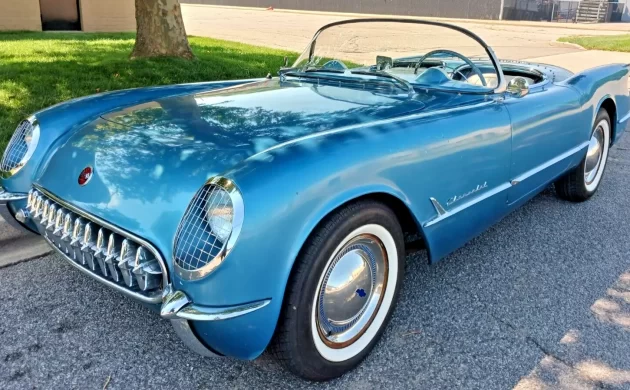
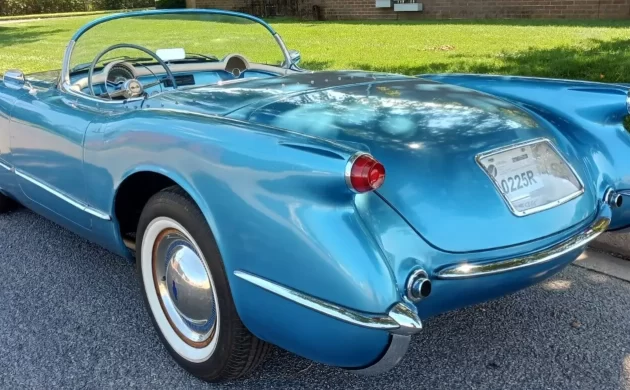
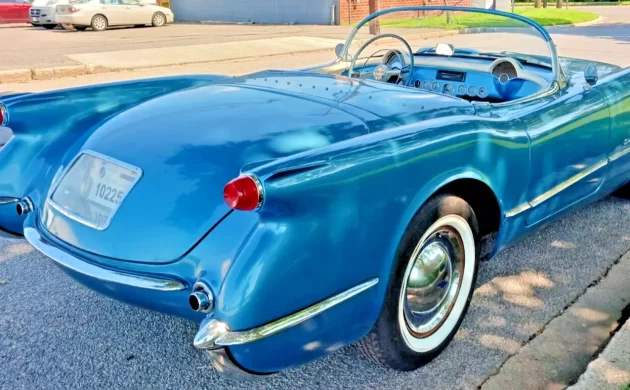
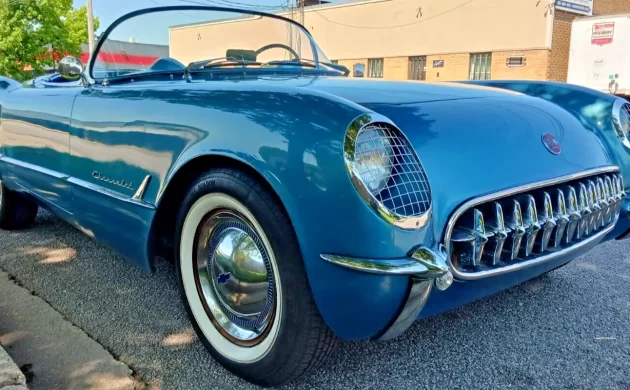
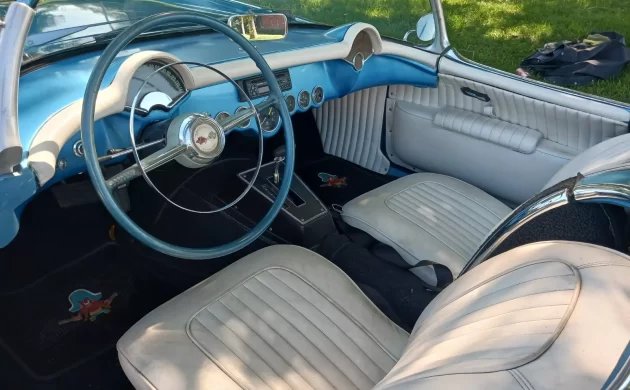
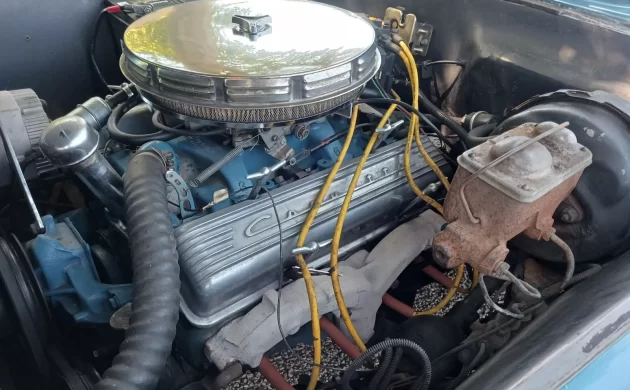
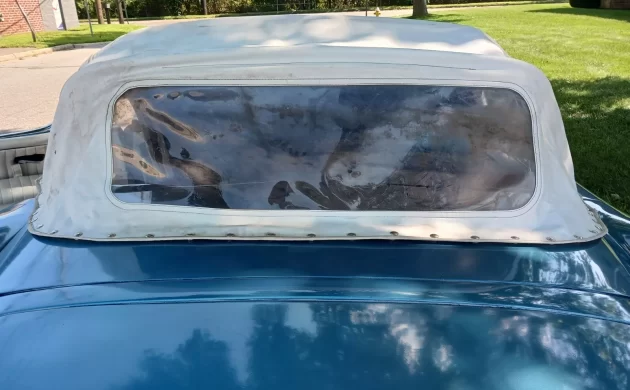



I’ve always wondered what it would cost to build a C1 Corvette from new parts. How would you register it?
Many states will register it as a 55 if it looks like one. Including Arizona. California will register it once it is a complete car with brakes, lights, horn, wipers, etc.
Air shocks, vintage glass pack mufflers, and a set of reversed Cragars wrapped with L60/15 tires in the rear. Color me gone.
A few garish touches but, all in all, it could be a fun car to drive to Saturday coffee. Dump the floor mats, shifter, and radio, forget the soft top, perhaps put in a 4 speed and cruise.
It would be nice to know more history ie frame, running gear, etc.
Its a 53/54 replica, 55 had the start of the coves!
correction, 53/55 same
That’s not correct, Al.
’55 was the same frame and same body as ’53 and ’54. The only difference was 265 V8 was offered. I know – I had one for several years.
What frame was up under these ?
Once you yanked out that cheesy shifter housing, you could probably repurpose it as a man-size Kleenex dispenser for the den.
It really doesn’t look too bad and with a little work it could look better. I would prefer a “Kindigit” car, but this one is a lot cheaper. I guess you get what you pay for
So…comments about the shifter and auto trans…that can be changed easy enough. Install a period shifter assembly attached to a 5 speed manual. Now you have a cruiser. RE: the convertible top…probably be driving with the top down anyway but sun would loosen it up and allow it to stretch and settle like it should probably. Kit vs. OEM…well, you could drive it and be less concerned about a stone chip. Imagine all the looks and thumbs up. How many people actually drive their real 55’s? I love the color, appreciate the affordable option to a real car, and wouldn’t be afraid to drive this car.
My problem is I’m already in a garage space challenging situation. Once I have that remedied, I’d be in a better position to consider, but that’s about a year out.
Not sure what frame it is on, but the rear end looks like a 7.5″ from the 70s to 80s – note the “fangs” on either side of the differential.
Its perfect or me. in 1955 I was a newly minted Master Chief of the UDT team 12 with mostly WWII men so very little funds to buy one of these, The tranny appears to be an automatic , good for my wounded legs. I’ll try to sell my truck quickly so I can purchase this faults and all, AND oh yeah I like the Continental, but …the corvette is sweeter for me.
Oil filler tube on the intake makes it a pre 68 engine. The ram horn exhaust manifolds also point to a pre 68 engine.
If my memory service correct, there was a company from Conroe, Texas, that used to make these replicas. They would bolt onto a 1978 to 85 Chevrolet Monte Carlo, Oldsmobile Cutlass, Buick Regal, Pontiac frame. I also thought the frames were shortened a little bit and I could be wrong, but I distinctly remember seeing this series Corvette body being placed on those platforms.
I have read more articles about cars than you could even imagine over the past 65 years and never recall the word “halo” being used. But in the Continental & the Corvette the word pops up. Have I been missing something?
An auto shift in a sports car, hot rod, or performance car defeats the car’s purpose IMO.
That shifter & mini console is from the other vette – a Chevette!
Hopefully the trans is not from one.
Needs blue carpet, IMO.